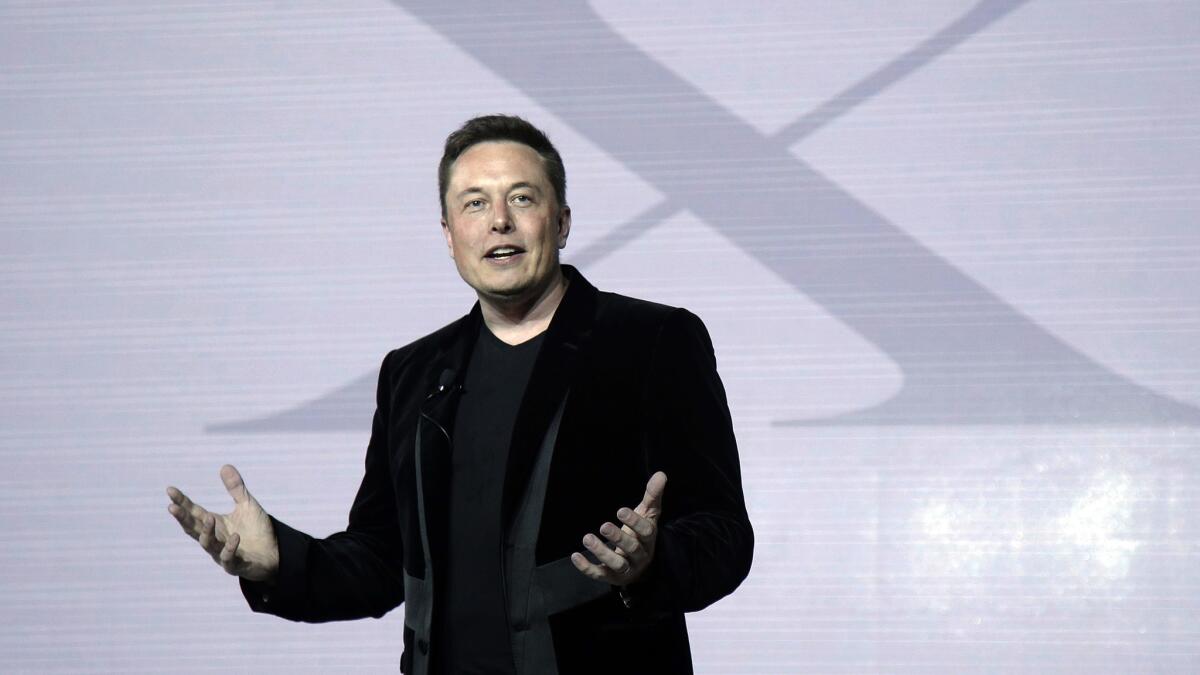Elon Musk announces plan to revolutionize factories

- Share via
Having already upset the traditional automobile industry with his electric cars and the space exploration business with his reusable Space X rockets, Tesla Motors Chief Executive Elon Musk will now set about trying to revolutionize the American factory.
In a freewheeling talk before shareholders Tuesday, Musk said he and his Tesla team will completely rethink the factory process, hoping to bring “factors of 10 or even 100 times” in improvements in efficiency to the manner in which “you build the machines that build the machine.”
Musk, returning repeatedly to the idea of “physics-first principles,” said he no longer uses an office at Tesla, but spends all of his time on the production line.
That exercise has shown him methods by which production capacity could be increased exponentially, he said, by applying those principles.
“The most important point I want to make is … that we’ve realized that the true difficulty and where the greatest potential lies is in building the factory,” Musk said.
Charging the world’s best automotive factories with using outmoded and inefficient systems, Musk said, “We can make dramatic improvements to the machine that makes the machine. A lot of people will not believe us about this, but I am absolutely convinced this can be accomplished.”
Speaking to shareholders at the Computer History Museum in Mountain View, Calif., Musk spent more than two hours reviewing the history of the Bay Area-based electric car company -- reminding his support group of investors and engineers about how many times Tesla could have gone under and how many ways the company has surprised critics.
The co-founder and CEO used the word “hubris” repeatedly and took complete responsibility for cost overruns and delayed delivery of Tesla’s “falcon-wing” SUV, the Model X.
Calling the Model X program “challenging,” Musk said, “I particularly need to fault myself for … putting too much technology all at once into a product. We have these great ideas. The smart move would have been to table those for version 2 or version 3.”
He promised Model X owners that the doors, which have experienced difficulties, will now work correctly.
“If you order a Model X now, or soon, trust me, you will love the doors,” he said. “Because the software will actually be right.”
The year so far has been one of big promises for Tesla. This spring the company unveiled its long-awaited Model 3, the planned long-range, $35,000 electric car for the masses.
In May Tesla announced a July 29 “grand opening” for its huge “gigafactory” lithium ion battery plant in northern Nevada.
To shareholders, Musk repeated his promise that the company can grow from a projected 80,000 to 100,000 vehicles a year for 2016 to nearly five times that by 2018 – and perhaps as many as a million cars a year by 2020.
Pointing to the company’s history, he insisted that such growth was nothing compared with the production ramp-up Tesla underwent going from 1,500 units a year in 2010 on its first vehicle, the Roadster, to 110,000 units a year, five years later, of its much more complex Model S.
Although Musk did not make the point specifically, his statements about modernizing the American factory are meant in part to address concerns about whether Tesla’s Fremont, Calif., automobile plant can be capable of maintaining production of the Model S and Model X while beginning production of the less expensive Model 3 -- in a manner that can make it possible at the proposed price.
Tesla began taking deposits for Model 3 the day it was unveiled, saying it expected as many as 100,000 customers would step up. In fact, the company received orders for more than 350,000 cars, which it must now build.
Musk closed the three-hour meeting by taking questions from shareholders, defending Tesla’s tax incentives, government loans and labor practices, periodically handing off certain questions to senior Tesla staffers.
He may have also disappointed Model 3 buyers by telling them that they would not have access, at the base price, to the “free long-distance charging” system currently available to all owners of the Model S and Model X.
Those chargers enable all Tesla owners to replenish their batteries at charging stations spread across the U.S., and in some other countries.
Model 3 owners won’t get that service without paying for it.
“It will still be very cheap, and far cheaper than buying gasoline,” Musk said. “But it will not be free long-distance charging for life unless you purchase that package.”
MORE AUTO NEWS
What’s driving vehicle sales in California?
Faraday Future gets one step closer to building electric cars in California
Follow me on Twitter @misterfleming




